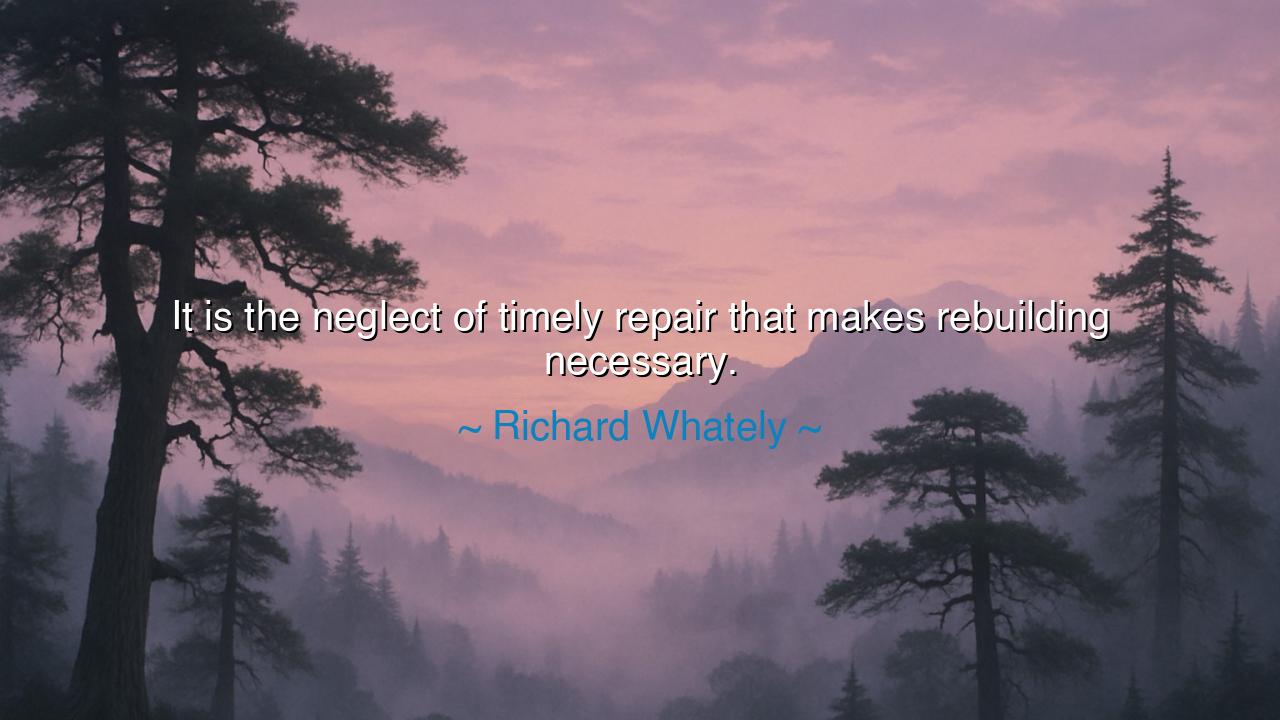
It is the neglect of timely repair that makes rebuilding






Neglect is a silent destroyer, creeping slowly until it unleashes ruin. When Richard Whately declared, “It is the neglect of timely repair that makes rebuilding necessary,” he spoke not only of buildings and structures but of nations, relationships, and even the human soul. His words remind us that small problems, left unattended, grow into mighty calamities. A single crack in a wall, if ignored, can bring down a house; a single wrong uncorrected can bring down an empire. Timely repair is the guardian of stability, while neglect is its doom.
At the heart of this wisdom lies the virtue of vigilance. Life constantly presents us with challenges—conflicts to resolve, injustices to correct, duties to uphold. When these are met promptly with care and courage, they remain manageable. But when they are postponed, out of fear, pride, or laziness, they compound and fester. Thus, what could have been resolved with a small effort grows into a crisis requiring rebuilding, a task far greater and more painful than simple maintenance. Whately’s teaching is a call to act early and wisely, before destruction becomes inevitable.
History offers striking examples of this truth. The fall of the Roman Empire did not occur in a single night. For centuries, corruption spread through its institutions, and small rebellions were ignored or crushed without addressing their causes. Each failure to enact timely reform weakened the empire’s foundations. By the time leaders finally recognized the depth of the decay, it was too late. The collapse was no longer preventable, and the mighty empire that had ruled the known world crumbled into fragments, requiring centuries of rebuilding through the chaos of the Dark Ages.
On a more personal level, consider the realm of relationships. When distrust or resentment arises between friends, spouses, or allies, it begins as a small wound. If addressed quickly through honesty and reconciliation, harmony can be restored. But if ignored, the wound deepens into hatred and estrangement. What once required only a gentle word may later demand years of rebuilding through tears and struggle. Thus, Whately’s teaching applies to the human heart as much as to kingdoms and cities.
The same principle governs societies and governments. When leaders fail to address injustice, inequality, or corruption at their roots, they invite revolutions and upheavals. The French Revolution is a powerful example. Had the monarchy enacted timely reforms to ease the suffering of the common people, France might have evolved peacefully. Instead, centuries of neglect led to an explosion of anger and violence that destroyed the old order entirely. What could have been repaired with wisdom had to be rebuilt through blood and fire.
Let this teaching be etched into the memory of future generations: small acts of care today prevent great acts of desperation tomorrow. Whether in the walls of a home, the bonds of friendship, or the foundations of a nation, timely repair is the work of the wise. For as Whately teaches, to ignore the cracks is to invite collapse, and to rebuild what has been destroyed is always harder than to preserve what still stands.






GDGold D.dragon
This quote really makes me think about the larger systems at play, like the environment or even politics. We often neglect small issues, thinking they don’t have an immediate impact, but eventually they add up to a crisis. I wonder how we can make sure we’re not letting these ‘small’ issues snowball in areas like climate change or social justice. How do we build a society that values timely repairs instead of waiting for the rebuild?
NLLuu Ngoc Lan
I like how this quote highlights the consequences of neglecting smaller problems, but it also makes me think about how often we fear change. Maybe people avoid fixing things because they’re afraid of the effort or disruption it might cause, even if they know the issue will get worse. How do we overcome that fear of the effort required to address issues in their early stages? Is it about mindset or more about developing better habits?
NN31. Huynh Do Ngoc Nhu
This quote feels like a call to action, emphasizing that doing things when they’re small can prevent bigger problems later. But I wonder, though, if it’s possible to overdo it and be too focused on ‘fixing’ things that aren’t really broken. Can we ever find the right balance between making timely repairs and letting things take their natural course? How do we determine which issues deserve immediate attention and which can wait?
MDMai Dinh
This makes me think about how we handle our emotions or mental health. We often don’t address feelings of anxiety, stress, or dissatisfaction right away, thinking they’ll go away on their own. But neglecting them only leads to bigger issues down the road. How can we teach ourselves—and others—to act sooner, instead of waiting until things fall apart before seeking help or making changes?
QDquoc dang
I think this quote is especially relevant in personal growth. We often overlook small flaws or habits that we think we can fix later, but eventually, they become bigger obstacles. It’s a reminder that if we don’t put in the work to correct things in the present, we might end up facing a much harder challenge down the road. But is it possible to know what needs fixing right away, or do we sometimes only realize it too late?